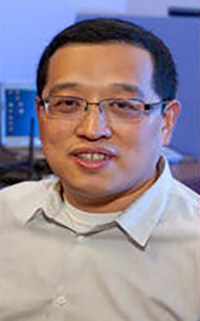
A Florida State University researcher who is working to develop less expensive but and more reliable wireless communications channels has received major recognition — and support — for his work.
Zhenghao Zhang, an assistant professor in the Department of Computer Science, has won a prestigious Faculty Early Career Development (CAREER) Award from the National Science Foundation (NSF). Such awards are designated for young scientists who are still in the early stages of their academic careers and are intended to help them build upon previous accomplishments in their respective areas of research.
His CAREER Award will provide Zhang with $450,883 in funding over the next five years. With it, he will seek to design a new kind of wireless data network to make use of airwaves not used by any TV broadcasting stations. This newly available bandwidth, known as “TV white space,” would enable the new network to provide similar data services as the current cellular phone networks at comparable speeds but at much lower cost.
“The radio frequencies on these white spaces have very good propagation properties and are ideal for wireless communications,” Zhang said. That’s because white space is located in a lower band of the electromagnetic spectrum than Wi-Fi, which means its signals can travel farther and better penetrate barriers, such as walls and trees.
“A network utilizing TV white space would provide a much more inexpensive alternative than the current wireless data technologies such as 3G or 4G, because the white-space spectrum is free,” Zhang said. “Users could enjoy data coverage at lower costs, and new business would be enabled. “The expected results of my project include protocols and algorithms optimized for the unique features of this new network and tested with experiments.”
An abstract of Zhang’s NSF project proposal, “Addressing Fundamental Challenges for Wireless Coverage Service in the TV White Space,” can be viewed here.
Zhang said he is appreciative of the research opportunities that the award enables.
“I feel very fortunate to receive the NSF CAREER Award, which allows me to get into this exciting field of TV white space research,” he said. “With support from this award, I hope I will be able to invent novel technologies to provide better and cheaper wireless data services to users.”




